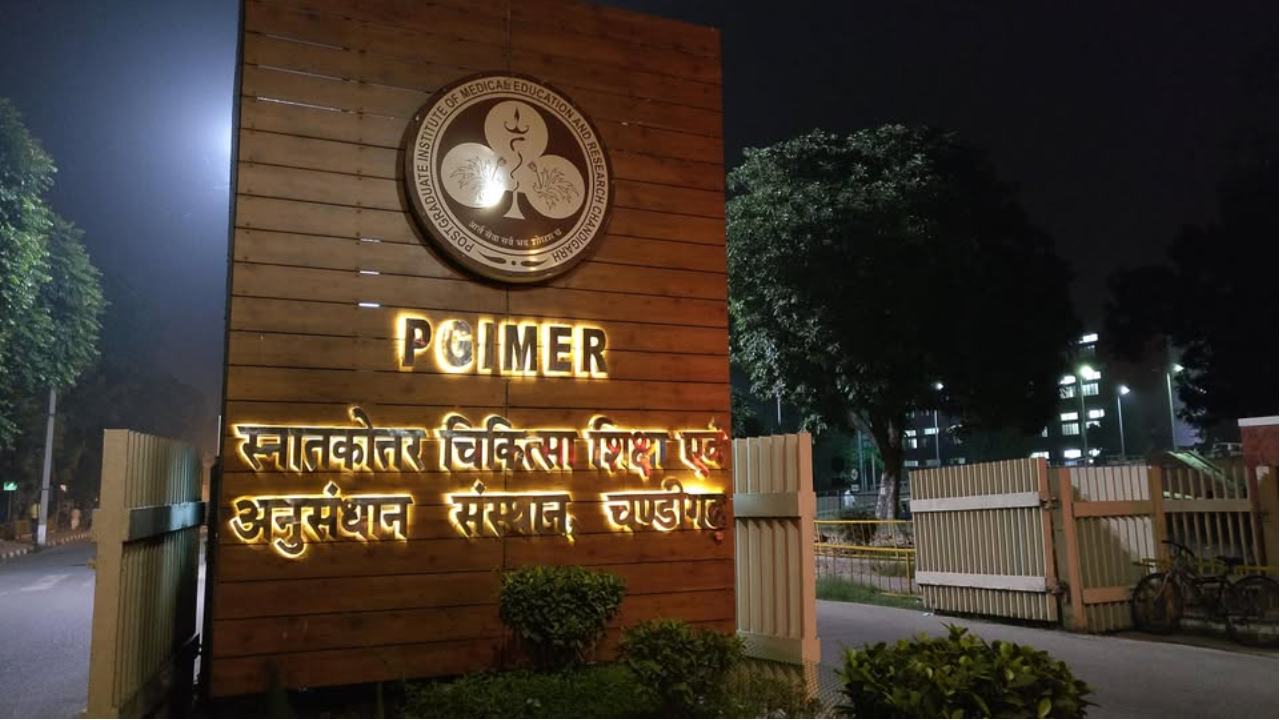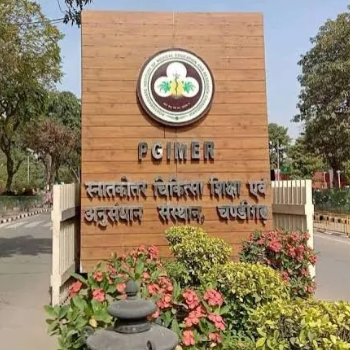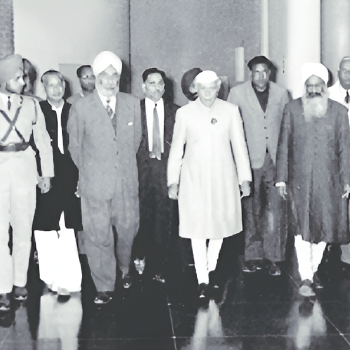Postgraduate Institute of Medical Education & Research (PGIMER), Chandigarh

The Postgraduate Institute of Medical Education and Research (PGIMER) in Chandigarh, India, stands as a beacon of excellence in medical education, research, and healthcare. Established in 1962, PGIMER has earned its reputation as an 'Institute of National Importance' and a leading tertiary care hospital in Northern India. This article delves into the what, where, who, how, when, and why of PGIMER, providing a detailed exploration of its history, academic programs, facilities, research contributions, and its pivotal role in shaping medical education and patient care in India.
What is PGIMER Chandigarh?
PGIMER Chandigarh is a premier public medical university dedicated to postgraduate medical education, research, and advanced healthcare services. Recognized as an Institute of National Importance by an Act of Parliament in 1967, it serves as a center of excellence for training medical professionals, conducting cutting-edge research, and providing high-quality patient care. The institute offers a wide range of postgraduate, super-specialty, and doctoral programs, alongside a few undergraduate courses, making it a hub for advanced medical learning and innovation.

PGIMER is also a World Health Organization (WHO) Collaborating Centre, reflecting its global influence in medical research and training. It caters to patients from Northern India, including Punjab, Haryana, Himachal Pradesh, Jammu and Kashmir, Uttarakhand, Bihar, and Uttar Pradesh, and is renowned for its comprehensive clinical services across all medical specialties, super-specialties, and sub-specialties.
Where is PGIMER Located?
Situated in Sector-12, Chandigarh, PGIMER occupies a strategic location in a city known for its planned architecture and high quality of life. Chandigarh, the joint capital of Punjab and Haryana, is a Union Territory designed by the renowned architect Le Corbusier. The institute’s campus spans a significant area, equipped with state-of-the-art infrastructure, including modern classrooms, a well-stocked library, seminar halls, hostels, and advanced medical facilities. Its location in Chandigarh ensures accessibility for patients and students from across Northern India, with excellent connectivity via road, rail, and air.
The institute also plans to expand its reach with a satellite center in Sarangpur, Chandigarh, where a 100-seat MBBS college is expected to commence operations by 2025. This expansion underscores PGIMER’s commitment to addressing the growing demand for medical education and healthcare services in the region.
Who Founded PGIMER and Who Runs It?
PGIMER was conceived in 1960 with the vision of creating a center of excellence for postgraduate medical education and research. The institute was formally established in 1962 under the Government of undivided Punjab, with its hospital, named Nehru Hospital, inaugurated by India’s first Prime Minister, Jawaharlal Nehru, on July 7, 1963. The founders of PGIMER include distinguished medical professionals such as Prof. Tulsi Das, Prof. Santokh Singh Anand, Prof. P.N. Chuttani, Prof. B.N. Aikat, Prof. Sant Ram Dhall, and Prof. Bala Krishna, who laid the foundation for its academic and clinical excellence.

After the reorganization of Punjab in 1966, PGIMER came under the administrative control of the Union Territory of Chandigarh. In 1967, it was declared an autonomous body under the Ministry of Health and Family Welfare, Government of India. Today, PGIMER operates as a deemed university, governed by its own administrative body and supported by the Ministry of Health and Family Welfare and the National Medical Commission (NMC). Dr. Biman Saikia currently serves as the Officer-In-Charge of the institute’s website and is a key figure in its administrative framework.
How Does PGIMER Operate?
PGIMER operates as a multifaceted institution with a mandate to provide high-quality patient care, attain self-sufficiency in postgraduate medical education, and conduct intensive research to advance medical knowledge. Its operations are structured around three core pillars: education, research, and healthcare.
Education
PGIMER is primarily a postgraduate institute, offering over 50 training programs, including postgraduate (MD, MS, MDS), super-specialty (DM, M.Ch), doctoral (Ph.D.), and fellowship courses. It also provides a limited number of undergraduate programs, such as B.Sc. Nursing, B.Sc. Medical Technology, and Bachelor of Physiotherapy (BPT). The institute is set to introduce a 100-seat MBBS program at its Sarangpur satellite center by 2025. Admission to most programs is entrance-based, with exams like the Institute of National Importance Combined Entrance Test (INI-CET) for postgraduate and super-specialty courses and PGIMER’s own entrance exams for other programs.
The institute’s academic programs are supported by a robust faculty of over 600 members, specializing in fields such as endocrinology, radiology, public health, surgery, neurology, and cardiology. PGIMER’s curriculum emphasizes hands-on training, research, and clinical exposure, ensuring that graduates are well-equipped to serve as specialists and educators in medical institutions across India.
Research
PGIMER is a leader in medical research, with numerous funded projects supported by national and international agencies. The institute houses specialized research centers, such as the Centre for Advanced Research in Evidence-Based Child Health, led by Prof. Meenu Singh, which collaborates with Cochrane South Asia and conducts systematic reviews and training programs. The Department of Psychiatry, established in 1963, is a WHO Collaborating Centre for mental health research and training, offering specialized clinics and advanced programs like DM in Child and Adolescent Psychiatry.
PGIMER’s research efforts span various disciplines, including gastroenterology, hepatology, public health, and oncology. The institute’s blood bank, one of the largest hospital-based centers in India, handles approximately 60,000 units of blood annually and conducts advanced research in blood component storage and management.
Healthcare
As a tertiary care hospital, PGIMER serves over one million patients annually in its outpatient department and around 100,000 in its emergency and inpatient departments. The institute operates 160 specialty and super-specialty outpatient departments (OPDs) and provides advanced diagnostic and treatment facilities, including imaging, radiology, and surgical services. Its blood bank and component lab are critical to its operations, ensuring efficient storage and distribution of blood components like plasma and platelets.
PGIMER’s commitment to patient care is evident in its adoption of schemes like Ayushman Bharat (PMJAY), which provides accessible healthcare to underserved communities. The institute’s infrastructure, including modern operation theaters, intensive care units, and diagnostic laboratories, supports its role as a leading healthcare provider in Northern India.
When Was PGIMER Established, and What Is Its Historical Significance?
PGIMER was conceptualized in 1960 as a response to the need for a specialized institution to train medical professionals and advance healthcare in India. It was formally established in 1962 under the Government of Punjab and became an autonomous body in 1967. The institute’s historical significance lies in its role as a pioneer in postgraduate medical education, setting benchmarks for training specialists who have gone on to lead medical institutions across India.
The inauguration of Nehru Hospital in 1963 by Jawaharlal Nehru marked a significant milestone, establishing PGIMER as a key healthcare provider in the region. Over the decades, the institute has grown into a global leader, earning recognition as a WHO Collaborating Centre and ranking second in the National Institutional Ranking Framework (NIRF) 2024 for medical institutes, trailing only AIIMS Delhi. Its consistent ranking among the top medical institutions globally, including #301-350 in the QS World University Rankings by Subject 2025, underscores its enduring impact.
Why Choose PGIMER Chandigarh?
PGIMER stands out for several reasons, making it a top choice for students, researchers, and patients:
Academic Excellence
PGIMER’s focus on postgraduate and super-specialty education ensures that students receive specialized training in fields like cardiology, neurology, and oncology. Its faculty, comprising experienced professionals, fosters a rigorous academic environment. The institute’s NIRF 2024 ranking of second in the medical category and its global rankings reflect its academic prowess.
Research Opportunities
With over 50 training programs and specialized research centers, PGIMER offers unparalleled opportunities for medical research. Its collaborations with global organizations like WHO and Cochrane South Asia enhance its research capabilities, making it a hub for evidence-based medicine and innovation.
Comprehensive Healthcare
PGIMER’s tertiary care services cater to a diverse patient population, offering advanced treatments in specialties like psychiatry, oncology, and cardiology. Its large-scale blood bank and specialized clinics, such as the Lithium Clinic and Autism Clinic, address complex medical needs.
Affordable Education
PGIMER offers quality education at affordable rates, with fees ranging from INR 1,000 to INR 1,950,000 for various programs. The median placement package for UG courses is INR 10 LPA, and for PG courses, it is INR 11.5 LPA, reflecting strong career prospects for graduates.
Modern Infrastructure
The institute’s campus is equipped with modern amenities, including a well-stocked library, smart classrooms, hostels, and sports facilities. The planned MBBS college at Sarangpur further demonstrates PGIMER’s commitment to expanding its infrastructure.
Academic Programs and Admission Process
PGIMER offers a diverse range of programs across medicine, nursing, and allied health sciences. Some of its flagship programs include:
- Undergraduate Programs: B.Sc. Nursing, B.Sc. Medical Technology (Radiology, Radiotherapy, Operation Theatre, Perfusionist), and Bachelor of Physiotherapy (BPT).
- Postgraduate Programs: MD, MS, MDS, M.Sc., and Master of Hospital Administration (MHA).
- Super-Specialty Programs: DM and M.Ch in specialties like cardiology, neurology, and gastroenterology.
- Doctoral and Fellowship Programs: Ph.D., FNB, and fellowships in fields like Consultation-Liaison Psychiatry.
Admission Process
Admission to PGIMER is highly competitive and primarily entrance-based. For postgraduate and super-specialty courses like MD, MS, DM, and M.Ch, candidates must appear for the INI-CET, conducted twice a year for January and July sessions. For other programs, PGIMER conducts its own entrance exams, such as the Nursing Entrance Exam for B.Sc. Nursing and Post-Basic B.Sc. Nursing. The application process involves:
- Visiting the official PGIMER website .
- Registering under the ‘Students’ tab and filling out the online application form.
- Submitting required documents, including academic certificates and entrance exam scores.
- Paying the application fee via demand draft or NEFT.
- Appearing for the entrance exam and counseling session for shortlisted candidates.
For UG programs, candidates must have completed 10+2 with at least 50% marks in Physics, Chemistry, Biology, and English (45% for reserved categories). The age limit is 17-25 years for most UG courses. For postgraduate programs, a relevant bachelor’s degree is required, and admissions are based on INI-CET scores or PGIMER’s entrance exams.
Facilities and Infrastructure
PGIMER’s campus is designed to support both academic and clinical excellence. Key facilities include:
- Academic Resources: A well-equipped library with access to digital journals, smart classrooms, and seminar halls.
- Healthcare Infrastructure: Nehru Hospital, advanced diagnostic labs, 160 specialty and super-specialty OPDs, and a state-of-the-art blood bank.
- Student Amenities: Hostels, sports facilities, Wi-Fi, and wheelchair-accessible infrastructure.
- Research Centers: Specialized centers like the Centre for Advanced Research in Evidence-Based Child Health and the Department of Psychiatry’s WHO Collaborating Centre.
The institute’s blood bank, one of the largest in India, processes 60,000 units of blood annually, utilizing advanced equipment like contact shock freezers to optimize plasma storage. This infrastructure supports PGIMER’s role as a leader in both patient care and research.
Rankings and Achievements
PGIMER’s excellence is reflected in its consistent rankings:
- NIRF 2024: Ranked 2nd in the Medical category with a score of 80.83, behind only AIIMS Delhi.
- QS World University Rankings 2024: Ranked 301-350 in Life Sciences, Clinical, and Medicine.
- US News Best Global Universities: Ranked #1253 globally, based on academic reputation and research output.
- Careers360 2025: Ranked 36 among public universities.
The institute’s WHO Collaborating Centre status and its contributions to evidence-based medicine, such as systematic reviews for Cochrane South Asia, highlight its global impact.
Challenges and Criticisms
Despite its achievements, PGIMER faces challenges, as noted in patient reviews. Issues include long queues, registration process inefficiencies, and inadequate amenities for patients’ families. Some reviews highlight poor hygiene in washrooms and delays in handling emergency cases, indicating areas for improvement in patient care and administrative efficiency.Future ProspectsPGIMER is poised for growth with the planned MBBS college at its Sarangpur satellite center by 2025. This expansion will enhance its capacity to train undergraduate medical students and address the shortage of medical professionals in India. The institute’s focus on research, international collaborations, and affordable education ensures its continued relevance in the global medical landscape.
Conclusion
The Postgraduate Institute of Medical Education and Research (PGIMER), Chandigarh, is a cornerstone of medical education, research, and healthcare in India. Since its establishment in 1962, it has grown into an Institute of National Importance, offering world-class training, cutting-edge research, and comprehensive patient care. With its robust academic programs, state-of-the-art infrastructure, and commitment to excellence, PGIMER remains a top choice for aspiring medical professionals and patients alike. As it expands its offerings and infrastructure, PGIMER is set to continue its legacy as a leader in shaping the future of medicine in India and beyond.
Join Us
Stay updated with the latest Sarkari Jobs by joining our community. Follow us on social media and subscribe to our newsletter for regular updates.




